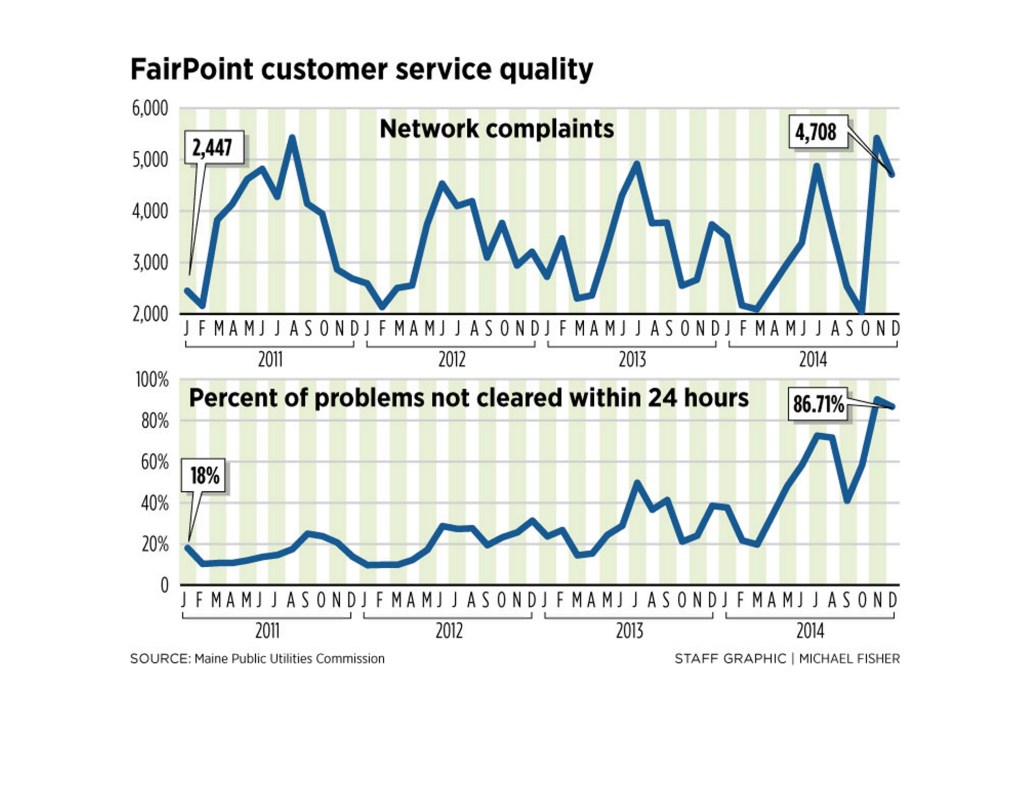FairPoint Communications’ ability to respond in a timely manner to customers’ problems has deteriorated since its workers went on strike in mid-October, according to company figures provided to the Maine Public Utilities Commission.
FairPoint’s report to the PUC, filed Monday afternoon, offers the first detailed look at just how much the Charlotte, North Carolina-based telecom company’s customer service has suffered since roughly 1,800 workers in northern New England, including nearly 900 in Maine, walked off the job at midnight on Oct. 16. Tuesday marked the 110th day of the strike.
In October, the company reported there were 2,036 “network trouble reports,” or customer-reported service problems. That figure leaped 166 percent in November, when customers reported 5,417 service problems. In December, the number dropped slightly to 4,708.
The length of time in which FairPoint’s temporary workforce, which was brought in to replace the striking workers, was able to “clear” network problems also grew after the strike began. In November, more than 90 percent of problems were not fixed within 24 hours, and in December it was 86.71 percent. Those rates compare to 58.4 percent in October and 21.17 percent in October 2013.
Those percentages are far above the PUC’s requirement that no more than 12.35 percent of customer service problems wait more than 24 hours to be fixed.
The data provided in the report did not come as a surprise to Tim Schneider, Maine’s public advocate.
“Really, it just confirms what we’ve seen anecdotally from the calls we receive,” Schneider said.
When the strike began, the company claimed it had a contingency plan to ensure customers would be unaffected by the strike. That clearly wasn’t the case, Schneider said.
“The decline in service quality we’ve seen is not consistent with the assurances we received from the company when the strike started,” he said.
“The reason these metrics exist is to make sure the company provides safe, reliable phone service, and you don’t get a pass on that obligation.”
However, the company’s service quality problems started long before the strike did, he said.
For example, the company has not hit the PUC’s benchmark for the percentage of troubles not resolved within 24 hours since April 2012.
“FairPoint was bad before and it’s getting worse,” Schneider said.
FairPoint has offered landline telephone and Internet service to customers in Maine, New Hampshire and Vermont since 2007, when it bought Verizon’s landline business in northern New England for $2.3 billion.
FairPoint spokeswoman Angelynne Beaudry said the company “regrets the delays noted in the report,” but noted that the figures it provides to the PUC “in no way reflects the overall stability of the FairPoint network.”
“Our backlog has been caused by many factors, including weather, but we’re making progress,” Beaudry said in a statement. “Today our trouble load across Maine, New Hampshire and Vermont is down over 60 percent from peak levels that occurred after the historic fourth quarter storms and comparable to levels experienced in mid-October.”
But she acknowledged that the company needs to do more.
“We know we have even more work to do, and we will continue to make every effort we can to improve service quality now and in the future,” she said.
Over the past few years, the company has consistently lost landline telephone customers.
In December, it reported it maintained roughly 210,000 access lines, down 30 percent from January 2011, when it had roughly 303,500.
While the PUC no longer regulates the telecommunications industry as a whole, it does still regulate the dozen or so telephone companies designated to provide basic local telephone service, known as Provider of Last Resort service.
FairPoint is required to file reports like the one submitted Monday because it is the Provider of Last Resort in its service territory.
The PUC tracks five metrics for the telecommunications companies that are Provider of Last Resort: the percentage of installation appointments not met because of company reasons, average delay days for missed appointments, network trouble report rate, percentage of network troubles not resolved within 24 hours, and the number of major service outages.
In its new report, FairPoint failed two of the metrics: the percentage of service problems unresolved after 24 hours and the percentage of installation appointments not met because of company reasons.
The company reported a rolling average over the past year of 1.76 percent missed appointments. The PUC benchmark is 0.975 percent.
The fourth quarter was not the first time the company has failed to meet customer service quality benchmarks. It failed the same two benchmarks in the third quarter of last year, and the PUC has opened an investigation into why the company failed and whether to levy a financial penalty.
A spokesperson for the striking unions, the International Brotherhood of Electrical Workers and Communications Workers of America, would not comment on the company’s report to the PUC, citing ongoing mediation efforts in Washington, D.C., and a request from the Federal Mediation and Conciliation Service for the parties to refrain from commenting publicly on the strike. Representatives for the company and union have been in mediation since Jan 4.
Send questions/comments to the editors.



Comments are no longer available on this story